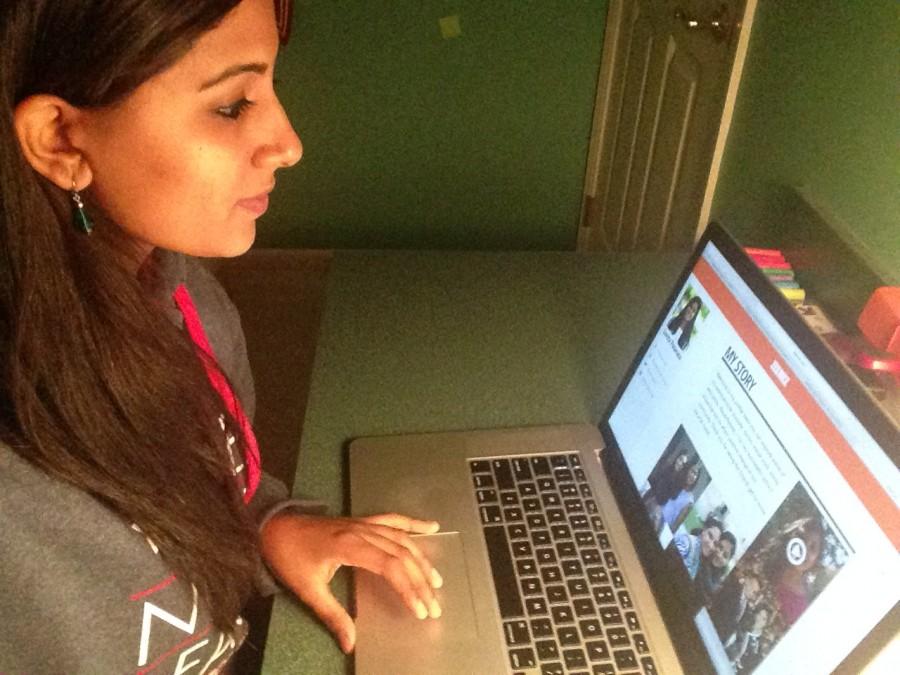New website personalizes college applications
November 20, 2014
Senior Michelle Yuen opens up her computer, navigates to an all-too-familiar page and blankly stares at the text box before her. The activities section of the common application, as daunting as it is restrictive, allows little room to describe much of anything in detail, let alone her extensive extracurricular accomplishments.
Yuen is not alone. Along with seniors across the country, she undertakes the stressful phases of writing, rewriting, revising and worrying over the essays and activity sections which are so central to any college application. Zeemee, a newly founded startup, aims to transform this process by emphasizing personal presentation over traditional description.
“As we have spoken with thousands of students and parents over the past 18 months, we have discovered the two biggest pain points in relation to college admissions to be the inability to truly showcase all of one’s talents and skills and the anxiety that accompanies the application process as a whole,” Zeemee co-founder and CPO Adam Metcalf said.
Zeemee, a website that launched just a few weeks ago, puts a face to the name on the college application by providing a link to a unique social media profile of the applicant. This profile allows pictures, personal videos and more informal descriptions of extracurricular activities.
“Nowhere on the common app do you get to see and hear the applicant describe him or herself,” said Savita Potarazu, one of 20 Youth Outreach Coordinators and a senior at Sidwell Friends. “With Zeemee, you’re allowed to get creative about the way you portray yourself.”
According to senior Austin Abdun-Nabi, the college application essays do not allow for thorough expression and place too much pressure on succinct writing.
“They are definitely stressful because you only get one shot at getting into college,” Abdun-Nabi said. “You only get 500 characters to show who you are as a person, and you cannot really know what they are looking for.”
According to Potarazu, Zeemee is currently targeting high school juniors and seniors, but hopes to soon achieve recognition among underclassmen in the coming months through online awareness campaigns.
However, one of the downsides to Zeemee is that colleges may not be willing to spend limited time and effort on an additional link when they already have so much to review.
According to College and Career Coordinator Luana Zimmerman, the greatest challenges to Zeemee’s growth are redundancy and time constraints. Selective colleges want to see creativity in the form of essays, not necessarily in pictures, and the online profile would likely be ignored by larger schools that receive tens of thousands of applications each year.
While Zimmerman finds that colleges have limited demand for the “generic form of expression” that Zeemee provides, those associated with the startup remain optimistic.
According to Metcalf, the company has worked with many admissions representatives from multiple prestigious universities as well as recognized faculty who suggest that that Zeemee has the opportunity to “revolutionize” the college application. The company’s advisory board includes Dr. Robert Chernak, Senior Vice-Provost of George Washington University, Russ Ramsey, Chairman of the Board Emeritus at George Washington University, and Phil Herget, Chairman of the College Foundation at UVA.
The startup’s unique “My Video” feature may also be its most popular among these notoriously hard-to-please college admissions officers.
“The video introduction that we encourage students to complete on their ZeeMee profile is something that admissions officers have told us they love,” Metcalf said. “This is an opportunity for a student to make their application come to life and provide a vivid, visual depiction of the story they are telling two-dimensionally in their essays.”
Zeemee also appeals to those concerned by the essay prompts of the common app as well as of school-specific applications, both of which tend to emphasize story-telling over personal description and creativity.
“Not everyone has a traumatic or dramatic story to tell,” Potarazu said. “In the college process, if you don’t have a story, or are guilty of being privileged, you’re at a disadvantage.”
Furthermore, another of Zeemee’s chief objectives is alleviating the stress of describing high-school life in a short time frame by allowing students to work on the applications throughout high school.
“Instead of packing the application process into a 3-6 month period, all students would have completed applications by the spring semester of their junior year: when the time to apply comes around, they simply click ‘submit,’ and a highly stressful, angst-ridden process is redefined by one that is relaxed, calculated, and efficient,” Metcalf said.
According to Zimmerman, social media has grown faster than anyone could have anticipated and may very well influence the college process presently and in the future. Those involved with Zeemee would claim this is a positive trend, not something to be dreaded by students and parents as it is currently.
“We are the Instagram generation, always framing our life through different lenses, and we should be able to take advantage of that,” Potarazu said.
Including a link to an applicant’s Zeemee profile might be preferable to another popular trend among CHS upperclassmen: changing names on Facebook to hide one’s profile from prying college admissions officers. Some even delete their accounts for fear of an off-color comment or a picture counting against them in the application process.
“I could see why they would do it, [but] it would be better to make sure you don’t do things that are bad for colleges in the first place,” Abdun-Nabi said.
Zeemee aims to merge social media with college applications at a time when it seems toxic to do so in order to benefit not only students, but also admissions officers.
“If one day the common app can be replaced by Zeemee, it will add a flavor that officers do not get a taste of currently,” Potarazu said. “They will be seeing who [we] truly are instead of reading between the lines.”


